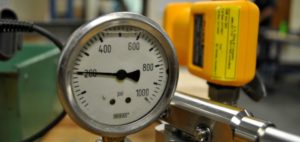Metrology Glossary: Barometer
What Is A Barometer?
A barometer is a device designed to gauge the atmospheric pressure exerted by the air above a specific location. The barometer reading decreases as air pressure rises. Decreased air pressure, often signaled by a low barometer reading, can suggest bad weather conditions may happen, whereas increased air pressure, denoted by a high barometer reading, commonly signifies fair weather. Additionally, barometers have the capacity to ascertain altitude since air pressure declines as elevation increases.
What Are Barometers Used For?
Barometers play a vital role in measuring atmospheric pressure, crucial for meteorology, aviation, and medicine. They predict weather changes based on pressure fluctuations, aiding short-term forecasts. Barometers also function as altimeters, determining altitude by leveraging the inverse relationship between air pressure and height. This altitude measurement is essential for aircraft navigation and mountaineering. Additionally, barometers serve in calibrating other pressure-measuring instruments, ensuring accuracy in scientific research and industrial applications. This multifaceted utility highlights the barometer’s significance in diverse fields, from providing weather insights to contributing to precise measurements in various scientific and industrial settings.







